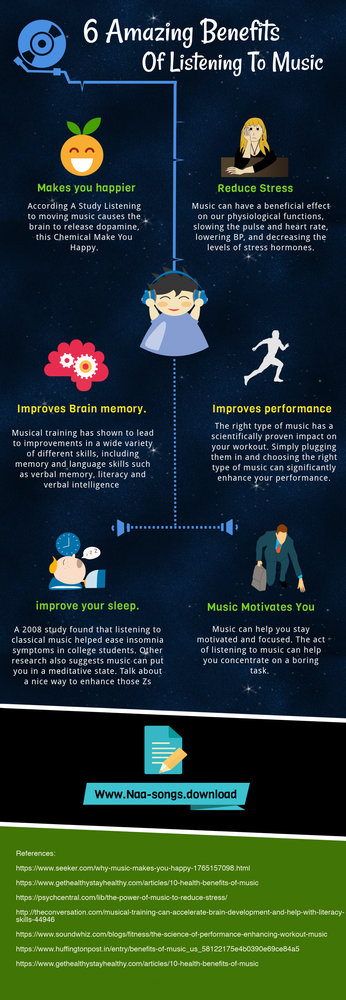Music - Questions
Table of ContentsSongs Things To Know Before You BuyGetting My Music To WorkThe 9-Minute Rule for SongsInstruments for Dummies
Dr. Music. Olivardia encourages parents to be more curious about their children’s musical interests rather than critical. When children identify with a type of music and a parent criticizes it, they can feel personally attacked (https://sco.lt/7MyFeq). Watch the full video to learn more about how music can connect us to ourselves, others, and different cultures: Dr.Do you listen to music on a regular basis? Maybe you tune the radio dial to a favorite station while you cook or pop in your earbuds when you head out for a walk. Personally, I’m such a dinosaur that I still enjoy the CDs from my large collection acquired over many years - https://www.merchantcircle.com/blogs/top-music-spot-miami-fl/2022/11/The-8-Second-Trick-For-Music/2335268.

Because listening to music can reduce anxiety and relieve depression, it can be combined with meditation to produce even greater benefits. Quiet music with a familiar melody can be an aid in meditation to produce a feeling of calmness. If you’re listening to music for the purpose of destressing, you should focus on the music.
Singing Fundamentals Explained
Specifically, listening to music improved the speed of spatial processing and the accuracy of linguistic processing (Music). In a study at the Stanford University School of Medicine, researchers used brain imaging to study how the brain reacts to music listening. They found that music listening activates areas of the brain that help us to pay attention to incoming information.
Listening to calm, soothing music at bedtime can help you sleep. Music with a slow tempo and pleasant, harmonious sounds can help you to unwind before trying to sleep. The effects of the music will aid in relaxation, allowing you to slow your breathing. This will help to decrease tension, blood pressure, and heart rate.
The technical storage or access that is used exclusively for statistical purposes. The technical storage or access that is used exclusively for anonymous statistical purposes. Without a subpoena, voluntary compliance on the part of your Internet Service Provider, or additional records from a third party, information stored or retrieved for this purpose alone cannot usually be used to identify you.
Music can have a profound effect on both the emotions and the body. Faster music can make you feel more alert and concentrate better. Upbeat music can make you feel more optimistic and positive about life. A slower tempo can quiet your mind and relax your muscles, making you feel soothed while releasing the stress of the day.
How Piano can Save You Time, Stress, and Money.
Research confirms these personal experiences with music. Current findings indicate that music around 60 beats per minute can cause the brain to synchronize with the beat causing alpha brainwaves (frequencies from 8 - 14 hertz or cycles per second). This alpha brainwave is what is present when we are relaxed and conscious.
Researchers at Stanford University have said that "listening to music seems to be able to change brain functioning to the same extent as medication." They noted that music is something that almost anybody can access and makes it an easy stress reduction tool. So what type of music reduces stress the best? A bit surprising is that Native American, Celtic, Indian stringed-instruments, drums, and flutes are very effective at relaxing the mind even when played moderately loud.
Since with music we are rarely told the beats per minute, how do you choose the relaxation music that is best for you? The answer partly rests with you: You must first like the music being played, and then it must relax you. You could start by simply exploring the music on this web page (Guitar).
Forcing yourself to listen to relaxation music that irritates you can create tension, not reduce it. If that happens, try looking for alternatives on the internet or consult with Counseling Service staff for other musical suggestions. It is important to remember that quieting your mind does not mean you will automatically feel sleepy.
Facts About Instruments Uncovered
As Grease the musical nears the end of its 26-week run at the Dominion Theatre, director Nikolai Foster's grittier and more compelling take on the show has made it the theatre's most successful summer run since the.

This is very true, but the real value of having music in get redirected here your ears as you write or work out is seen in the lasting health that results in your brain and body. Merely listening to songs that you enjoy helps you in more ways than you could imagine. Studies at Johns Hopkins Medicine have shown that “listening to music can reduce anxiety, blood pressure, and pain, as well as improve sleep quality, mood, mental alertness, and memory.” Of course, music can not be used as a cure for any of these things, but it is important to note that listening to music you enjoy can actually change your long-term health and lifestyle.
It is not always easy to come up with original ideas but it seems music can help to distract you from the outside world and help you focus on the work in front of you. A study done at Berkeley explored how listening to music affected thinking skills and creativity.